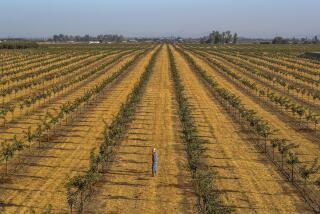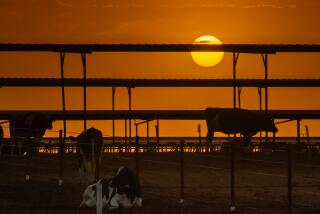State’s Farms Seen Healthier Than Midwest’s
SACRAMENTO — California agriculture faces continued “tough times” but will recover more quickly than will the nation’s Farm Belt, John R. Norton III, former deputy secretary of agriculture and himself a major Western grower, predicted Monday.
Norton, a free-market advocate frustrated in his efforts to phase out government farm subsidies, said in an interview that California’s strength lies in the fact that its huge fruit, vegetable and nut crops rely on supply and demand rather than federal aid.
“The unregulated sectors will heal fastest,” Norton said.
While 40% of California’s crop acreage grows subsidized commodities, they account for only about 25% of farmers’ cash receipts.
The new farm program enacted last December, Norton said, was his “greatest disappointment” as President Reagan’s deputy secretary from last June until his resignation in February.
Bail-Out Program
“The 1985 farm bill further institutionalizes our regression away from free-market agriculture,” he maintained. Current price supports for the dozen basic commodities covered by the program remain near historic highs, far above world market prices. Although the level of support is scheduled to drop annually over the legislation’s five-year life, Norton made plain his skepticism that this would happen significantly enough to drive out marginal producers.
“We’re giving more cash protection, creating a bigger dependency,” he said. “We’ve aggravated the problem.”
The Reagan Administration yielded to a bail-out program assembled by lawmakers, led by Senate Majority Leader Bob Dole (R-Kan.), representing “eight or 10” states in the Farm Belt, Norton said.
Ironically, however, California dairymen were the big winners in the most controversial of the programs contained in the new legislation--the so-called whole-herd buyout program under which more than 10% of the nation’s dairy cows are being sold to the government and slaughtered. One California producer will realize more than $8 million for thus agreeing to go out of the dairy business for five years.
“I got clobbered by the dairy buyout,” said Norton, whose agricultural interests in California and Arizona include a cattle operation in the San Joaquin Valley. “That’s about as bad a piece of legislation that I’ve ever seen come out of Congress.”
The initial slaughtering came as California cattle were due to move to market and sent beef prices tumbling. (After cattlemen in Texas took the government to court over the timing issue, the slaughtering schedule was modified to reduce further erosion of beef prices over the program’s 18-month life.)
This illustrates how a government program to deal with a problem in one sector can create new and unforeseen problems in others, Norton said. “It’s the rule of unintended consequences.”
Norton is among participants at a symposium here on farm policy and technology organized by the University of California’s new Agricultural Issues Center, based in nearby Davis.
And one of the points made at the symposium was that the interplay of biotechnology and information technology will nearly double milk production per cow by the year 2000. It will also greatly increase yields in the commodities already in oversupply--including corn, cotton, rice, soybeans and wheat, said Michael J. Phillips, a senior analyst with the Congressional Office of Technology Assessment.
“This will create monumental headaches for policy-makers,” Phillips predicted.
John A. Schnittker, former undersecretary of agriculture during the Johnson Administration, depicted current farm policies as “transitional”--leading to a new equilibrium as the value of farm assets bottoms out in the next year and price supports begin their scheduled decline. But, he and other symposium participants agreed, “the golden age” of expanding world markets and rising prices of the 1970s will not be repeated.
“That era is gone,” Schnittker said.
Because commodity price supports remain so far above world market prices, he said, any increases in market prices will reduce government costs without increasing farm profits. Indeed, he said, the farm bill could emerge as “a major political embarrassment in less than a year” should government costs not decrease significantly.
“Defense of big payments (to farmers) is now a major industry in Washington,” Schnittker said.
More to Read
Inside the business of entertainment
The Wide Shot brings you news, analysis and insights on everything from streaming wars to production — and what it all means for the future.
You may occasionally receive promotional content from the Los Angeles Times.










